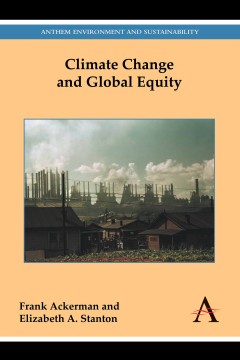Climate Change and Global Equity
By Frank Ackerman & Elizabeth A. Stanton
Anthem Frontiers of Global Political Economy and Development Anthem Environment and Sustainability Initiative
- About This Book
- Reviews
- Author Information
- Series
- Table of Contents
- Links
- Podcasts
About This Book
Ambitious measures to reduce carbon emissions are all too rare in reality, impeded by economic and political concerns rather than technological advances. In this collection of essays, Frank Ackerman and Elizabeth A. Stanton show that the impact of inaction on climate change will be far worse than the cost of ambitious climate policies.
After setting out the basic principles which must shape contemporary climate economics, Ackerman and Stanton consider common flaws in climate change policy – from mistaken assumptions that dismiss the welfare of future generations and anticipate little or no growth in low-income countries, to unrealistic projections of climate damages that dismiss catastrophic risks – and offer their own insightful remedies. They question the usefulness of conventional integrated assessment models (IAMs) that model the long-term interaction between economic growth and climate change, and propose an alternative in their Climate and Regional Economics and Development (CRED) model.
In this incisive work, Stanton and Ackerman offer a timely and original contribution to the fields of climate economics and global equity.
Reviews
“There is no better guide to the thicket of climate change economics than this insightful new book by Ackerman and Stanton. They uncover where the bodies are buried in conventional economic modeling, and reinvigorate the dialog with a commonsense approach to the economics of this civilizational challenge.” —Eban Goodstein, Director and Faculty, Bard MBA in Sustainability, and Director, Bard Center for Environmental Policy
“Ackerman and Stanton have written a state-of-the-art economic analysis of the most important environmental issue of our time. They build a compelling case for moving quickly to reduce greenhouse gas emissions, and for making fairness within and among nations a central element in how we do it.” —James Boyce, University of Massachusetts Amherst
Author Information
Frank Ackerman is a senior economist at Synapse Energy Economics and lecturer at Massachusetts Institute of Technology, and has written numerous books and articles on the economics of climate change, energy and environmental policy.
Elizabeth A. Stanton is a senior economist at Synapse Energy Economics and has written widely on the economics of equity and environment, climate change, energy efficiency and renewable energy.
Series
Anthem Frontiers of Global Political Economy and Development
Anthem Environment and Sustainability Initiative
Table of Contents
Introduction; Publication History; PART I: PERSPECTIVES ON CLIMATE AND EQUITY; Chapter 1. Climate Economics in Four Easy Pieces; Chapter 2. Carbon Markets Are Not Enough; Chapter 3. Modelling Pessimism: Does Climate Stabilization Require a Failure of Development?; Chapter 4. The Tragedy of Maldistribution: Climate, Sustainability, and Equity; PART II: ANALYSES OF CLIMATE DAMAGES; Chapter 5. Climate Impacts on Agriculture: A Challenge to Complacency?; Chapter 6. Did the Stern Review Underestimate U.S. and Global Climate Change?; Chapter 7. Can Climate Change Save Lives? A Comment on “Economy-Wide Estimates of the Implications of Climate Change: Human Health”; PART III: THEORY AND METHODS OF INTEGRATED ASSESSMENT; Chapter 8. Inside the Integrated Assessment Models: Four Issues in Climate Economics; Chapter 9. Limitations of Integrated Assessment Models of Climate Change; Chapter 10. Negishi Welfare Weights in Integrated Assessment Models: The Mathematics of Global Inequality; PART IV: APPLICATIONS OF INTEGRATED ASSESSMENT MODELS; Chapter 11. Climate Risks and Carbon Prices: Revising the Social Cost of Carbon; Chapter 12. Epstein-Zin utility in DICE: Is Risk Aversion Irrelevant to Climate Policy?; Chapter 13. Fat Tails, Exponents, Extreme Uncertainty: Simulating Catastrophe in DICE; Chapter 14. Climate Damages in the FUND Model: A Disaggregated Analysis; Chapter 15. Climate Policy and Development: An Economic Analysis; Appendix: Supplementary Data for Chapter 3; Notes; References
Links
Stay Updated
Information
Latest Tweets



